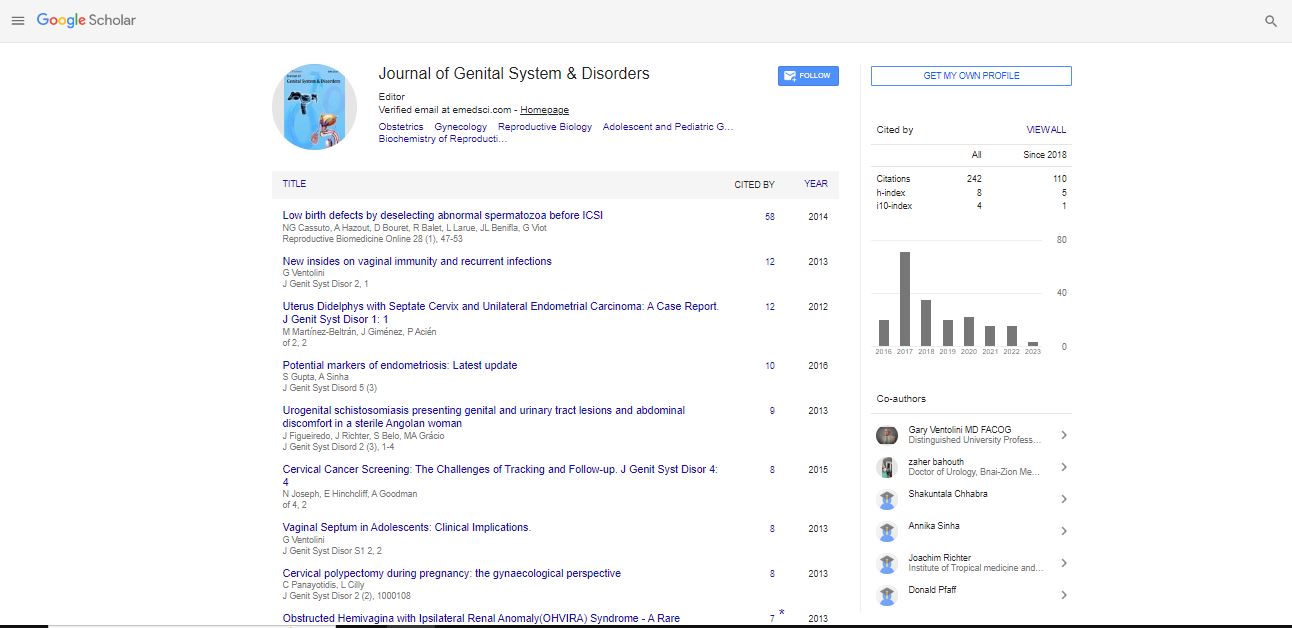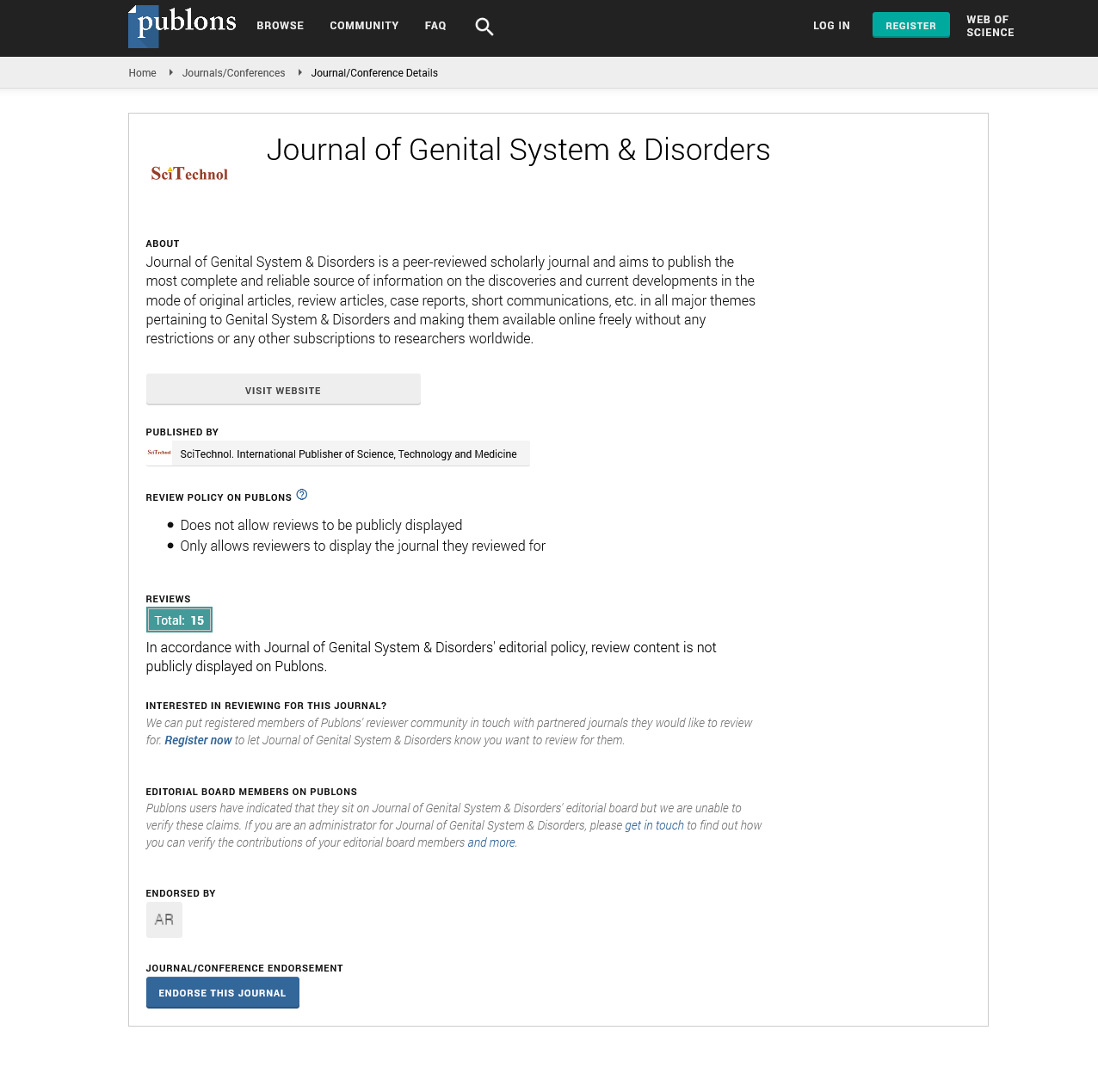Commentary, J Genit Syst Disord Vol: 12 Issue: 2
Reproductive Endocrinology: Understanding the Complexities of Human Fertility
Okada Jeing*
1Department of Biology, Waseda University, Shinjuku-ku, Tokyo, Japan
*Corresponding Author: Okada Jeing,
Department of Biology, Waseda
University, Shinjuku-ku, Tokyo, Japan
E-mail: jeing.okada@uni.edu.jp
Received date: 22 May, 2023, Manuscript No. JGSD-23-107293;
Editor assigned date: 24 May, 2023, PreQC No. JGSD-23-107293(PQ);
Reviewed date: 08 June, 2023, QC No. JGSD-23-107293;
Revised date: 16 June, 2023, Manuscript No. JGSD-23-107293(R);
Published date: 26 June, 2023 DOI: 10.4172/2325-9728.1000275.
Citation: Jeing O (2023) Reproductive Endocrinology: Understanding the Complexities of Human Fertility. J Genit Syst Disord 2023, 12:2.
Description
Reproductive endocrinology is an interdisciplinary branch of medicine that investigates the complex interplay of hormones and their influence on human reproduction. The intricate regulation of the Hypothalamic-Pituitary-Gonadal (HPG) axis is fundamental to maintaining fertility in both males and females. The key concepts in reproductive endocrinology, including the hypothalamic-pituitarygonadal axis, menstrual cycle regulation, and the role of hormones in male and female reproductive function. Furthermore, it explores various hormonal disorders that can affect fertility and the advancements in reproductive endocrinology that have revolutionized the field of assisted reproductive technology.
Hypothalamic pituitary gonadal axis
The HPG axis plays a pivotal role in regulating reproductive function. The hypothalamus secretes Gonadotropin-Releasing Hormone (GnRH), which stimulates the release of Luteinizing Hormone (LH) and Follicle-Stimulating Hormone (FSH) from the pituitary gland. In females, FSH promotes follicular development and estradiol production, while LH triggers ovulation and stimulates progesterone synthesis. In males, LH stimulates leydig cells to produce testosterone, whereas FSH supports spermatogenesis. Precise coordination between the hypothalamus, pituitary gland, and gonads is vital for optimal reproductive function.
Menstrual cycle regulation
In females, the menstrual cycle is a complex interplay of hormonal events that prepare the reproductive system for potential pregnancy. Follicular development is initiated by FSH, leading to estrogen production by developing follicles. Estrogen promotes endometrial thickening and the growth of a dominant follicle. The mid-cycle surge of LH triggers ovulation, followed by the formation of the corpus luteum, which produces progesterone. Progesterone prepares the endometrium for implantation and supports early pregnancy. If fertilization does not occur, hormone levels decline, leading to menstruation. Menstrual cycle regulation is a delicate balance of hormonal signals and feedback mechanisms. Disruptions in this intricate process can lead to menstrual irregularities, such as amenorrhea (absence of menstruation), oligomenorrhea (infrequent or light menstruation), or menorrhagia (excessive or prolonged menstrual bleeding). Several factors, including hormonal imbalances, stress, medical conditions, and lifestyle factors, can influence menstrual cycle regularity.
Hormonal disorders and infertility
Various hormonal disorders can disrupt reproductive function and cause infertility. Polycystic Ovary Syndrome (PCOS), characterized by hormonal imbalances, anovulation, and multiple ovarian cysts, is a common endocrine disorder affecting women. Hypogonadotropic Hypogonadism (HH) involves a deficiency in GnRH secretion, resulting in low levels of LH and FSH and impaired gonadal function. In males, testosterone deficiency (hypogonadism) can lead to reduced sperm production and impaired fertility. Effective management of hormonal disorders is essential for restoring fertility.
Advancements in reproductive endocrinology
Reproductive endocrinology has witnessed remarkable advancements, particularly in the field of Assisted Reproductive Technology (ART). Techniques such as in vitro fertilization, Intra- Cytoplasmic Sperm Injection (ICSI), and Pre-implantation Genetic Testing (PGT) have revolutionized fertility treatment. ART allows couples facing infertility to achieve successful pregnancies by overcoming various reproductive challenges. Additionally, fertility preservation techniques, such as oocyte and embryo cryopreservation, provide options for preserving fertility in individuals undergoing medical treatments that may affect reproductive function.
Conclusion
Reproductive endocrinology encompasses the intricate hormonal regulation of human fertility. Understanding the complexities of the HPG axis, menstrual cycle regulation, and the impact of hormonal disorders is crucial for diagnosing and managing fertility-related issues in both men and women. The advancements in reproductive endocrinology, particularly in ART, offer hope to couples struggling with infertility. Continued research and technological innovations will further enhance our understanding of reproductive endocrinology and contribute to improved reproductive healthcare outcomes.
 Spanish
Spanish  Chinese
Chinese  Russian
Russian  German
German  French
French  Japanese
Japanese  Portuguese
Portuguese  Hindi
Hindi 
